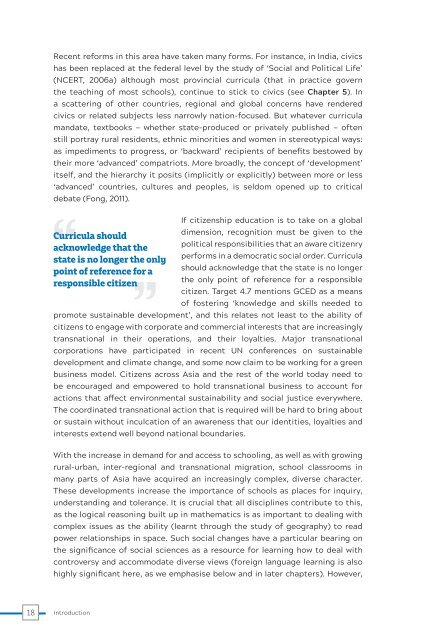Rethinking Schooling for the 21st Century
UNESCO MGIEP officially launched 'Rethinking Schooling for the 21st Century: The State of Education, Peace and Sustainable Development and Global Citizenship' in 2017 at the UNESCO General Conference. This study analyses how far the ideals of SDG 4.7 are embodied in policies and curricula across 22 Asian countries and establishes benchmarks against which future progress can be assessed. It also argues forcefully that we must redefine the purposes of schooling, addressing the fundamental challenges to efforts to promote peace, sustainability and global citizenship through education.
UNESCO MGIEP officially launched 'Rethinking Schooling for the 21st Century: The State of Education, Peace and Sustainable Development and Global Citizenship' in 2017 at the UNESCO General Conference. This study analyses how far the ideals of SDG 4.7 are embodied in policies and curricula across 22 Asian countries and establishes benchmarks against which future progress can be assessed. It also argues forcefully that we must redefine the purposes of schooling, addressing the fundamental challenges to efforts to promote peace, sustainability and global citizenship through education.
You also want an ePaper? Increase the reach of your titles
YUMPU automatically turns print PDFs into web optimized ePapers that Google loves.
Recent re<strong>for</strong>ms in this area have taken many <strong>for</strong>ms. For instance, in India, civics<br />
has been replaced at <strong>the</strong> federal level by <strong>the</strong> study of ‘Social and Political Life’<br />
(NCERT, 2006a) although most provincial curricula (that in practice govern<br />
<strong>the</strong> teaching of most schools), continue to stick to civics (see Chapter 5). In<br />
a scattering of o<strong>the</strong>r countries, regional and global concerns have rendered<br />
civics or related subjects less narrowly nation-focused. But whatever curricula<br />
mandate, textbooks — whe<strong>the</strong>r state-produced or privately published — often<br />
still portray rural residents, ethnic minorities and women in stereotypical ways:<br />
as impediments to progress, or ‘backward’ recipients of benefits bestowed by<br />
<strong>the</strong>ir more ‘advanced’ compatriots. More broadly, <strong>the</strong> concept of ‘development’<br />
itself, and <strong>the</strong> hierarchy it posits (implicitly or explicitly) between more or less<br />
‘advanced’ countries, cultures and peoples, is seldom opened up to critical<br />
debate (Fong, 2011).<br />
Curricula should<br />
acknowledge that <strong>the</strong><br />
state is no longer <strong>the</strong> only<br />
point of reference <strong>for</strong> a<br />
responsible citizen<br />
If citizenship education is to take on a global<br />
dimension, recognition must be given to <strong>the</strong><br />
political responsibilities that an aware citizenry<br />
per<strong>for</strong>ms in a democratic social order. Curricula<br />
should acknowledge that <strong>the</strong> state is no longer<br />
<strong>the</strong> only point of reference <strong>for</strong> a responsible<br />
citizen. Target 4.7 mentions GCED as a means<br />
of fostering ‘knowledge and skills needed to<br />
promote sustainable development’, and this relates not least to <strong>the</strong> ability of<br />
citizens to engage with corporate and commercial interests that are increasingly<br />
transnational in <strong>the</strong>ir operations, and <strong>the</strong>ir loyalties. Major transnational<br />
corporations have participated in recent UN conferences on sustainable<br />
development and climate change, and some now claim to be working <strong>for</strong> a green<br />
business model. Citizens across Asia and <strong>the</strong> rest of <strong>the</strong> world today need to<br />
be encouraged and empowered to hold transnational business to account <strong>for</strong><br />
actions that affect environmental sustainability and social justice everywhere.<br />
The coordinated transnational action that is required will be hard to bring about<br />
or sustain without inculcation of an awareness that our identities, loyalties and<br />
interests extend well beyond national boundaries.<br />
With <strong>the</strong> increase in demand <strong>for</strong> and access to schooling, as well as with growing<br />
rural-urban, inter-regional and transnational migration, school classrooms in<br />
many parts of Asia have acquired an increasingly complex, diverse character.<br />
These developments increase <strong>the</strong> importance of schools as places <strong>for</strong> inquiry,<br />
understanding and tolerance. It is crucial that all disciplines contribute to this,<br />
as <strong>the</strong> logical reasoning built up in ma<strong>the</strong>matics is as important to dealing with<br />
complex issues as <strong>the</strong> ability (learnt through <strong>the</strong> study of geography) to read<br />
power relationships in space. Such social changes have a particular bearing on<br />
<strong>the</strong> significance of social sciences as a resource <strong>for</strong> learning how to deal with<br />
controversy and accommodate diverse views (<strong>for</strong>eign language learning is also<br />
highly significant here, as we emphasise below and in later chapters). However,<br />
18<br />
Introduction

















